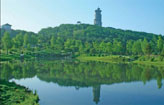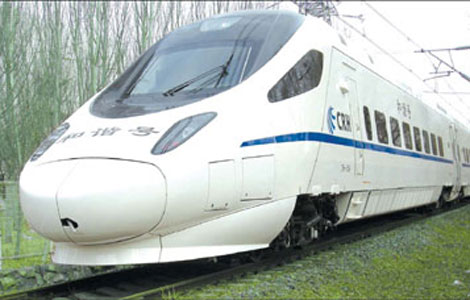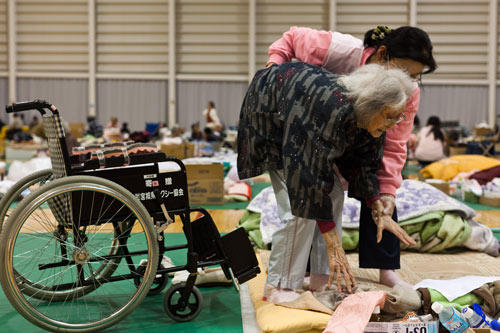Asia
Japan mulls banning access to nuke zone
Updated: 2011-04-21 07:57
By Mari Yamaguchi and Elaine Kurtenbach (China Daily)
|
Sueko Suzuki, 87, receives help from a caretaker at an evacuation center for hospital patients displaced by the earthquake and tsunami, in Ishinomaki, Miyagi prefecture on Tuesday. Yasuyoshi Chiba / Agence France-Presse |
TOKYO - Authorities may for the first time ban access to the evacuation zone around Japan's crippled nuclear plant, citing concerns on Wednesday over radiation risks for residents who may be returning to check on their homes.
About 70,000 to 80,000 people were living in the 10 towns and villages within 20 kilometers of the Fukushima Daiichi plant, which has been leaking radiation after a March 11 earthquake and tsunami wrecked its power and cooling systems.
Virtually all left after being advised to do so, but some occasionally have returned, defying warnings from police who have set up roadblocks on only a few major roads in the area.
"We are considering setting up 'caution areas' as an option for effectively limiting entry" to the zone, Chief Cabinet Secretary Yukio Edano said.
Noriyuki Shikata, one of Edano's deputies, said the government was still considering details of how to control access to the immediate vicinity of the nuclear plant while also responding to demands from residents to check their homes and collect belongings.
Now that the situation at the plant appears to have stabilized somewhat, both residents and the authorities are considering how to best weather a protracted evacuation. Only a few warning signs, mainly about road conditions, have been erected in the area so far.
"There are a number of people who may be entering the area. Under the current regime, we are not in a position to legally enforce - there's no penalty for entering into the area. There is a realization of a need to have a stronger enforcement of the area," Shikata said.
At present, police just keep track of people entering the evacuation zone by noting down their license plate numbers. Officials say one chief concern is that if there were a major accident, tracking down those inside would be difficult if not impossible.
It was unclear when the restrictions on entry into the area might be imposed.
In a step toward restoring the crippled nuclear plant's cooling systems, Tokyo Electric Power Co (TEPCO), the nuclear plant's operator, is pumping highly radioactive water from the basement of one of its turbine buildings to a makeshift storage area.
Removal of the first 10,000 tons of 25,000 tons of contaminated water that has collected just in the basement of the turbine building at unit 2 of the plant began on Tuesday and is expected to take at least 20 days, nuclear safety officials say. Fully ridding the plant of 70,000 tons of contaminated water in its turbine buildings and nearby trenches could take months.
Still, a senior official at the UN nuclear agency suggested the worst of the radiation leaks may be over in the worst nuclear power accident since the 1986 catastrophe in Chernobyl.
The total amount of radiation released is expected to be only a "small increase from what it is today" if "things go as foreseen", said Dennis Flory, a deputy director general at the International Atomic Energy Agency in Vienna.
IAEA experts are discussing ways to help Japan meet targets laid out in a blueprint for ending the crisis that TEPCO released over the weekend. Its plans call for achieving a cold shutdown of the plant within nine months. But government officials acknowledge that setbacks could slow the timeline.
In the meantime, TEPCO is continuing to spray water into the reactors and their spent fuel storage pools to help prevent them from overheating and releasing still more radiation.
TEPCO plans to use technology developed by French nuclear engineering giant Areva to reduce radioactivity and remove salt from the contaminated water inside the plant so that it can be reused to cool the reactors, said Hidehiko Nishiyama of Japan's Nuclear and Industrial Safety Agency.
TEPCO said on Wednesday it has begun distributing applications for compensation to residents forced to evacuate from their homes around the plant. The company is offering about $12,000 per household as interim compensation.
Associated Press
Specials

Urban breathing space
City park at heart of industrial hub positions itself as top tourism attraction

On a roll
Auto hub Changchun also sets its sight on taking lead in railway sector

The stage is set
The Edinburgh International Festival will have a Chinese flavor this year.
